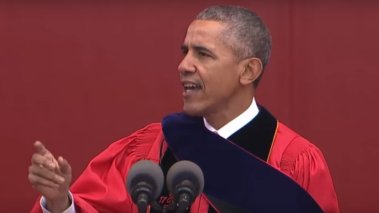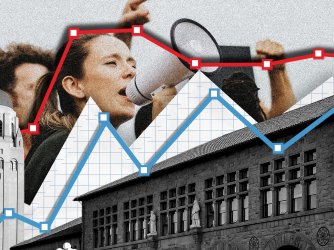Table of Contents
At Rutgers University, President Obama Again Joins Chorus of ‘Disinvitation Season’ Critics

In a string of commencement addresses as the academic year draws to a close, President Barack Obama criticized efforts by students and faculty to shut down speech or speakers they perceive to be offensive, urging them instead to engage the substance of what they find offensive.
At Rutgers University’s commencement ceremony on Sunday, President Obama urged graduates to find people they disagree with and challenge their ideas, rather than prevent them from speaking. As an example, President Obama pointedly cited Rutgers professors’ calls to disinvite former Secretary of State Condoleezza Rice from speaking at its commencement two years ago. President Obama’s remarks, in pertinent part, are worth reading:
And if participation means voting, and it means compromise, and organizing and advocacy, it also means listening to those who don’t agree with you. I know a couple years ago, folks on this campus got upset that Condoleezza Rice was supposed to speak at a commencement. Now, I don’t think it’s a secret that I disagree with many of the foreign policies of Dr. Rice and the previous administration. But the notion that this community or the country would be better served by not hearing from a former Secretary of State, or shutting out what she had to say—I believe that’s misguided. I don’t think that's how democracy works best, when we’re not even willing to listen to each other. I believe that’s misguided.
If you disagree with somebody, bring them in and ask them tough questions. Hold their feet to the fire. Make them defend their positions. If somebody has got a bad or offensive idea, prove it wrong. Engage it. Debate it. Stand up for what you believe in. Don’t be scared to take somebody on. Don’t feel like you got to shut your ears off because you’re too fragile and somebody might offend your sensibilities. Go at them if they’re not making any sense. Use your logic and reason and words. And by doing so, you’ll strengthen your own position, and you’ll hone your arguments. And maybe you’ll learn something and realize you don’t know everything. And you may have a new understanding not only about what your opponents believe but maybe what you believe. Either way, you win. And more importantly, our democracy wins.
President Obama’s remarks echo his commencement address at Howard University, where he told graduates that “[c]hange requires more than just speaking out. [...] [I]t requires listening to those with whom you disagree, and being prepared to compromise.”
The president’s remarks come at the tail end of a year filled with attempts to disinvite and disrupt speakers on campus. While it’s one thing to criticize a speaker’s acts or remarks, it’s another to attempt to prevent that person from speaking so that others can’t hear and engage with the message. FIRE’s disinvitation database tracks myriad attempts to disrupt or disinvite on-campus speakers by protesters from across the political spectrum.
On May 9, 2016, for example, students at Georgetown University called upon administrators to disinvite Secretary of Homeland Security Jeh Johnson from graduation ceremonies, citing Johnson’s enforcement of immigration policies and their desire to create “an inclusive and safe” graduation ceremony. Criticism of Johnson’s invitation follows repeated calls upon Georgetown administrators to prevent students from inviting Cecile Richards, president of Planned Parenthood, to speak in April.
Obama made student freedom of speech a theme in recent remarks addressing the need for divergent viewpoints on college campuses. When nominating Merrick Garland to the Supreme Court, President Obama highlighted Garland’s defense of a student speaker who was censored during a commencement address. And last fall, Obama called upon students, and the universities they attend, to protect avenues of vigorous debate, arguing “I don’t agree that you, when you become students at colleges, have to be coddled and protected from different points of view.”
As Frederick Douglass pointed out over 150 years ago, suppressing free speech is a “double wrong” as it “violates the rights of the hearer as well as the speaker.” President Obama’s repeated calls to engage with, rather than silence, speech and speakers underscore that message. FIRE hopes that students who care deeply about individual rights will consider this point when the next call for a disinvitation is made.
Recent Articles
FIRE’s award-winning Newsdesk covers the free speech news you need to stay informed.

A third of Stanford students say using violence to silence speech can be acceptable

Stanford president and provost cheer free expression in open letter to incoming class

FIRE survey shows Judge Duncan shoutdown had ‘chilling effect’ on Stanford students
